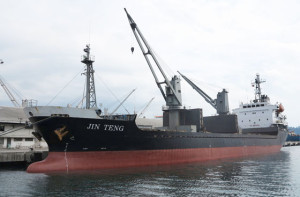THE Philippines became the first country to impose tough sanctions on North Korea when it impounded a freighter docked in Subic port in Zambales on Saturday.
Presidential Communications Undersecretary Manuel Quezon 3rd said the 6,830-ton cargo ship Jin Teng will not be allowed to leave Subic port and its crew will be deported.
Quezon said a resolution approved by the United Nations’ Security Council included the Jin Teng in the list of North Korean vessels subject to an asset freeze.
“We know the whole world has been affected by what is happening in North Korea because of its nuclear weapons program and its development of intercontinental ballistic missiles.
Because of this, the UN, through its Security Council, imposed sanctions,” Quezon said.
“The world is concerned over North Korea’s nuclear weapons program and as a member of the UN, the Philippines has to do its part to enforce the sanctions,” he added.
A team from the UN is expected to inspect the ship, Foreign Affairs spokesman Charles Jose said.
The Jin Teng, carrying palm kernels, was searched for the second time on Saturday, this time using electronic weapons sensors, coastguard spokesman Commander Armand Balilo said.
The ship arrived in Zambales just hours after the UN approved expanded sanctions on Pyongyang.
No explosives, drugs or banned substances have been found so far.
North Korea has no embassy in the Philippines. Its embassies in Thailand and Indonesia were unavailable for comment when contacted by Agence France-Presse.
Jose said the vessel was impounded in compliance with the tough new UN sanctions introduced in response to Pyongyang’s nuclear and ballistic missile tests in January.
The UN adopted the resolution on Wednesday.
Under the new sanctions, all cargo going to and from North Korea must be inspected by all countries. It also bans or restricts exports of coal, iron, iron ore and other minerals from North Korea, and prohibited the supply of aviation fuel, including for rockets.
The freighter’s 21 crewmen will eventually be deported, Jose added.
Jose said the Department of Foreign Affairs is coordinating closely with concerned government agencies like the Departments of Transportation and Communications (DOTC), Philippine Coast Guard and Department of Justice on the matter.
More punitive measures
The European Union also on Friday (Saturday) imposed additional punitive measures against North Korea over recent nuclear and ballistic missile tests carried out in defiance of UN resolutions.
The 28-nation bloc said it was adding 16 North Korean individuals and 12 entities to the sanctions blacklist which counts some 60 individuals and groups who were hit with travel bans and asset freezes after previous tests.
EU foreign affairs head Federica Mogherini said earlier this week the bloc would act swiftly on the UN lead, describing North Korea’s actions as a “grave threat to international peace and security in the region and beyond.”
The EU established diplomatic relations with North Korea in 2001 but contacts are minimal. Brussels adopted its first sanctions in 2006.
The names of the new sanctions targets will be announced in the EU’s Official Journal on Saturday.
But Russia voiced “deep concern” and urged restraint after North Korean leader Kim Jong-Un ordered that his country’s nuclear arsenal be readied for pre-emptive use at any time.
“We are following the development of the situation very closely and hope that all the countries in the region and third countries will maintain restraint and equanimity in this difficult situation,” Kremlin spokesman Dmitry Peskov said.
Bellicose rhetoric is almost routine for North Korea at times of elevated tensions but Peskov told reporters in Moscow that Kim’s latest declaration “caused deep concern” for Russia.
Kim ordered the North’s nuclear warheads deployed “on standby” in a widely-expected uptick in military saber-rattling from Pyongyang following the UN Security Council’s adoption of tough new sanctions.
While the North is known to have a small stockpile of nuclear warheads, experts are divided about its ability to mount them on a working missile delivery system.
Hours after the UN adopted the tougher sanctions, North Korea fired six short-range projectiles into the sea in a new show of defiance.
Russia—which enjoys friendly ties with the reclusive Stalinist regime —backed the tough UN measures against North Korea but Peskov said that Russian President Vladimir Putin told members of the security council that the North Korea situation was “extremely tense.”
WITH MICHAEL JOE T. DELIZO AND AFP


